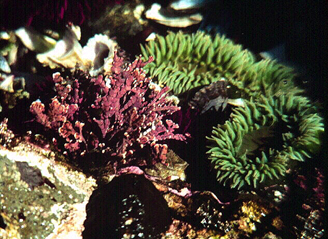September 30 – December 13, 2024
BI 211, 212, and 213 are prerequisites for all courses.
BI 454/554 Estuarine Biology (5 quarter hour credits) The biological and physical factors regulating production, abundance, distribution and diversity in estuaries. Includes field trips to marshes, tide flats, eelgrass beds and open waters. Meets Tuesdays 8:30 – 5:00. Meets on Tuesdays 8:30 – 5:00. Instructor: Richard Emlet
BI 457/557 Marine Biology: Molecular Marine Biology (5 quarter hour credits) An introduction to applying molecular biology to research using marine organisms. Lectures and readings examine the use of molecular data in taxonomy and systematics, population structure and conservation biology, and morphological and developmental evolution. Lab exercises include analysis and interpretation of existing data sets and the generation of new data using basic methods. Students acquire practical laboratory skills including collection and preservation of material for molecular work, DNA extraction, PCR amplification of suitable target genes, sequence analysis, and building and interpreting phylogenetic trees. Meets Wednesdays 8:30am-5:00pm. Instructor: Svetlana Maslakova.
See what students are saying about this course.
BI 458/558 Biological Oceanography (5 quarter hour credits) ) Examines the patterns of biological productivity and controlling physical and chemical mechanisms in the various environments of the world’s oceans. We will study and quantify the dynamics of key oceanographic processes at different spatial and temporal scales and how these impinge on marine ecosystem composition, structure and functioning. Involves field excursions and laboratory work. Meets on Thursdays 8:30 – 5:00 Instructor: Rowan McLachlan
BI 457/557 Marine Biology: Marine Science Communication (5 quarter hour credits) The ability to understand and effectively communicate scientific evidence to a variety of audiences is critical to success in many career paths. In this course students will read and write science-based communications including, but not limited to primary literature, scientific reviews, figures and graphs, oral presentations, museum exhibits, K-12 curricula, popular science, and social media. Students in this course will utilize the resources of OIMB to participate in marine science and translate those experiences for a public audience at the Charleston Marine Life Center. Includes a field trip to Hatfield Marine Science Visitor Center and Oregon Coast Aquarium in Newport, OR. Meets Fridays 8:30 -5:00. Instructor: Nicole Nakata
BI 199 Marine Life, Lifestyles, and Habitats (3 quarter hour credits). This course surveys key case studies that illustrate fundamentals of marine organismal biology. Four chapters examine different aspects of the diversity of life and its interconnections in the sea, covering food webs and trophic dynamics; marine biomes and biogeography; the Tree of Life and the scope of biodiversity; and symbiosis. Course lectures each start with a marine organism of interest as a focus around which to sketch inductive models, explore adaptations, and highlight open questions. Guided readings of influential works in marine biology supplement lectures to illuminate the history of important ideas. This course is restricted to freshmen. Remote, synchronous course. MWF 10-10:50am Instructor: George von Dassow
BI 401 Undergraduate Research (2-10 quarter hour credits) Students conduct a research project under the direction of an OIMB faculty member. Email the person with whom you wish to work to arrange for registration. Limit 8 students.
All students registering for OIMB courses should fill out an application for admission (see application form link above right) and, if needed, request room and board. Questions can be emailed to oimb@uoregon.edu.

